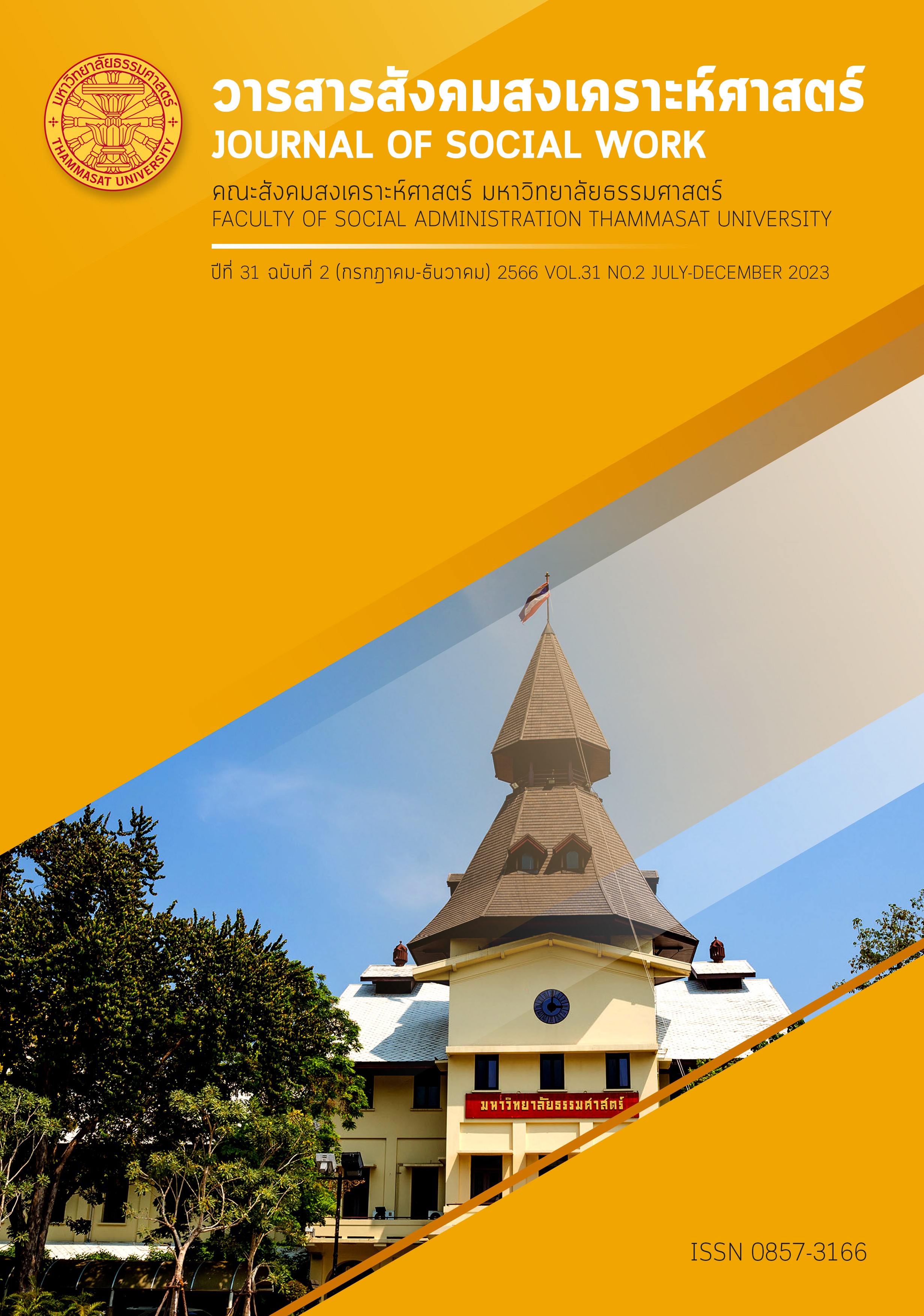The Capacity Development Evaluation of Women Occupational Groups of Women and Family Development Learning Center
Keywords:
The capacity development evaluation, Woman occupational training in communities, Women and family developmentAbstract
The objectives of this study aimed to survey and evaluate the operational performance of capacity development of women occupational groups, to classify the women occupational groups according to their capacity, and to prepare policy recommendations for elevating the capability of the women occupational group, whose most of the members are elderly people. The study was conducted on the basis of quantitative and qualitative study designs. As for the quantitative study, a questionnaire was used as the instrument for collecting data from 274 women occupational groups participating in the training for occupational skills development with 8 Women and Family Development Learning Centers.The qualitative study was conducted using group discussion and interviews with 32 groups and 3 management executives.
The results from the survey and operational performance evaluation of the capacity development of women occupational groups in communities were derived from 3 quality indicators, namely, the occupational training process of women occupational groups in communities, people participating in occupational training in communities, and the trainers themselves. Results of the capacity development of women occupational groups in communities revealed that this process enabled people participating in the training to gain more knowledge and skills, including generating more careers and income, ensured the products of the groups were assigned certified product standards, the preservation of art and local wisdom, strong family relationships, the promotion of women's roles and their self-esteem, and the strengthening of communities. As for capacity evaluation results of the occupational training program, this data stemmed from 4 main aspects, namely, the context or environment evaluation, input evaluation, process evaluation, and output evaluation, with evaluation results displaying high levels in all aspects. Evaluation results and classification of women occupational groups in communities according to their capacity in 5 aspects found leadership, management and production development to have high levels of capacity while membership and marketing displayed moderate levels of capacity. Factors rendering the groups stable and strong were leadership, group unity, promotion and support from government agencies, working capital, and products carrying strong identity.
References
กรมกิจการสตรีและสถาบันครอบครัว. (2560). ยุทธศาสตร์การพัฒนาสตรี พ.ศ.2560-2564. กรุงเทพฯ: กระทรวงการพัฒนาสังคมและความมั่นคงของมนุษย์.
กรมส่งเสริมการปกครองท้องถิ่น. (2558). รายงานประจำปี พ.ศ.2557 กรมส่งเสริมการปกครองท้องถิ่น. กรุงเทพฯ: โรงพิมพ์ชุมชนสหกรณ์การเกษตรแห่งประเทศไทย จำกัด.
กรรณิการ์ ทำมา. (2557). แนวทางการพัฒนากลุ่มอาชีพ : กรณีศึกษากลุ่ม
แปรรูปผลิตภัณฑ์จักสานจากต้นกกบ้านหว้า ตำบลบ้านหว้า อำเภอเมืองขอนแก่น จังหวัดขอนแก่น. การศึกษาอิสระปริญญารัฐประศาสนศาสตรมหาบัณฑิต สาขาวิชาการปกครองท้องถิ่น, วิทยาลัยการปกครองท้องถิ่น มหาวิทยาลัยขอนแก่น.
ระบบสถิติทางการทะเบียน. (2565). สถิติประชากรแยกรายอายุ. สืบค้นเมื่อวันที่ 27 มีนาคม 2565, https://stat.bora.dopa.go.th/stat/ statnew/statMenu/newStat/home.php.
นภาพรรณ พัฒนฉัตรชัย. (2555). ศักยภาพทางธุรกิจและการสร้างเครือข่ายทางธุรกิจของกลุ่มธุรกิจชุมชน. มหาวิทยาลัยราชภัฏสุรินทร์. สนับสนุนโดยสำนักบริหารโครงการวิจัยในอุดมศึกษาและพัฒนามหาวิทยาลัยวิจัยแห่งชาติ สำนักงานคณะกรรมการการอุดมศึกษา.
ปิยะ เพชรสงค์. (2553). รูปแบบการบริหารจัดการกลุ่มอาชีพเกษตรกรที่ได้รับการส่งเสริมและสนับสนุนจากองค์การบริหารส่วนตำบลในจังหวัดนครศรีธรรมราช. รายงานการวิจัย. มหาวิทยาลัยเทคโนโลยีราชมงคลศรีวิชัย.
พิชิต วงศ์คำ. (2551). แนวทางบริหารจัดการที่ส่งผลต่อความเข้มแข็งของกลุ่ม กรณีศึกษากลุ่มสตรีทอผ้าไหม บ้านหนองตาไก้ ตำบลหนองกง อำเภอนางรอง จังหวัดบุรีรัมย์. วิทยานิพนธ์ศิลปศาสตรมหาบัณฑิต สาขาสังคมศาสตร์เพื่อการพัฒนา มหาวิทยาลัยราชภัฎบุรีรัมย์.
สำนักสร้างความเข้มแข็งชุมชน, กรมพัฒนาชุมชน. (2560). แนวทางการจัดตั้งและพัฒนากลุ่มอาชีพ. สืบค้นเมื่อวันที่ 8 มกราคม 2565. http://www.oic.go.th/FILEWEB/CABINFOCENTER23/DRAWER021/GENERAL/DATA0000/00000016.PDF
Oliva, P. E. (1992). Developing the curriculum. (3th ed.). Boston: Allyn and Bacon.
Ornstein, A., & Hunkins, F. (2013). Curriculum: Foundations, Principles, and Issues. (6th ed.). Boston, MA: Pearson.
Patphol, M. (2015). Curriculum evaluation for learning and development. (3rd ed.). Bangkok: Charansanitwong Printing Co., Ltd.
Downloads
Published
How to Cite
Issue
Section
License
Copyright (c) 2023 Journal of Social Work

This work is licensed under a Creative Commons Attribution-NonCommercial-NoDerivatives 4.0 International License.
The manuscripts published in the Social Work Journal is the copyright of the Social Work Journal, Thammasat University
Any article or opinion appeared in the Social Work Journal will solely be under the responsibility of the author The Faculty of Social Administration, Thammasat University and the editors do not need to reach in agreement or hold any responsibility.



